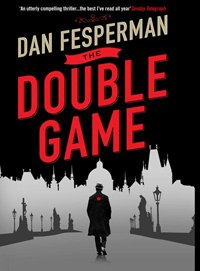
Two decades ago Bill Cage was a young journalist going places. The son of an American diplomat, he grew up in the service, moving from country to country as his father changed postings. His childhood gave him two things – a curiosity about the world, and a love of the spy thrillers his dad collected. What should have been the highlight of his career so far – a chance to interview the American espionage author Edwin Lemaster – turns to disaster. Lemaster, like John LeCarre, was a spy for his country before he began writing books. Slightly drunk, he teases Cage by suggesting that he may have considered working as a double agent.
Our hero doesn’t take the revelation seriously and wants to exclude it from his article, but the paper reports it as fact. After publication both men’s careers take a downturn. Lemaster is never the same writer, substituting his subtle character-driven work for tub thumping Clancy-like techno thrillers, and Cage leaves journalism to work in PR.
Back to the present day and Cage receives an anonymous note saying there is more to Lemaster’s confession than he realised, urging him to investigate further. His curiosity is piqued when his source communicates in code using text from famous and obscure spy thrillers to provide further clues. Cage takes a sabbatical from work, and is back in the stamping grounds of his youth – Vienna, Prague, and Budapest – hunting for a long-lost manuscript, a tell-all fictionalisation, which will blow the lid off Lemaster’s secrets and a lot more besides. He’s not the only player in the game though, the Russians want the book for their own reasons and the CIA will do just about anything to avoid embarrassment… including murder.
What Fesperman delivers is not just a spy thriller, but using the Cage’s recollections of reading his collection of old spy novels, this turns into a tribute to those books. Authors, individual books, even individual paragraphs are critiqued and praised. Fesperman genuinely loves the genre, and I loved his idea of using these novels in this cryptic way. By doing this, he points you towards some really good reads.
However The Double Game has some weaknesses. I never really got a sense of the different places Cage travels to, and that’s a serious misgiving if you compare it to, say, Ambler or LeCarre. The motivation of the hidden people manipulating Cage, when revealed, falls a little flat. Enjoyable as the decryption of the codes is, it seems like the stakes weren’t quite so high after all.
I enjoyed this book, but I enjoyed the concept behind it more. It has sent me back to my bookshelves to dig out a copy of Judgement on Deltchev, and that can’t be bad.
Corvus
Print/Kindle/iBook
£2.48
CFL Rating: 3 Stars